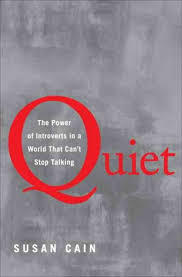What We're Reading: Quiet by Susan Cain
By Carol Hoffman
08-04-2014
Understanding how introverts interact with and contribute to our workplaces and communities
 I recently read Quiet: The Power of Introverts in a World That Can’t Stop Talking by Susan Cain.
I recently read Quiet: The Power of Introverts in a World That Can’t Stop Talking by Susan Cain.
Cain defines introverts as those who “have a preference for a quiet, more minimally stimulating environment,” conditions that are often undervalued and hard to find in the loud world in which we live.
According to Quiet, at least one-third of the people we know or are associated with are introverts. These people might prefer listening to others rather than speaking, staying home with a good book, or watching a television show rather than going out to a party and socializing with friends. In other words, they recharge by “going quiet.” As a result, these individuals are often stereotyped as being shy, socially awkward and ill equipped for leadership roles. Cain encourages us to take a step back from the stereotypes and consider the power of different styles in affecting change, innovating new ideas and leading organizations.
In her book, Cain emphasizes how our culture often misunderstands the traits and capabilities of introverted people in communication, the workplace, school and at home. She points out that we owe many of society’s great contributions to introverts, and that great leadership can come from either introverts or extroverts. For example, in her research Cain found that introverts excel at leading proactive employees because they have a tendency to be better listeners and consequently let good employees run with their ideas. Extroverts, on the other hand, are often better at leading more passive employees because extroverts have a knack for motivating and inspiring others.
Quiet does not support one way of being over another. It sees the value in both traits and encourages the reader to do the same. It is quite possible that the quiet, shy, unassuming person sharing an office space with you, sitting across from you at the dinner table, or staring at you in the mirror, may just be the next Einstein, Rosa Parks or Warren Buffet -- all introverts.
In closing, whether you are an introvert or an extrovert, when reading this book you will benefit from the insights and the power to permanently change how we see introverts and, equally important, how introverts see themselves.
